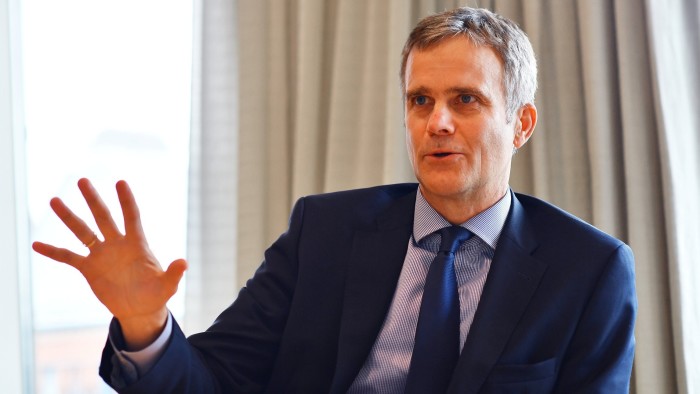Unlock the Editor’s Digest for free
Roula Khalaf, Editor of the FT, selects her favourite stories in this weekly newsletter.
A quarter of BP investors have voted against the re-election of outgoing chair Helge Lund in the biggest protest against the head of a FTSE 100 board for five years.
Preliminary results from the energy company’s annual general meeting on Thursday showed that 24.3 per cent of BP’s shareholders had voted against Lund, who said this month that he would step down “most likely during 2026”.
Murray Auchincloss, BP chief executive, was re-elected with more than 97 per cent of the vote, while the company’s remuneration plan was approved by 95.5 per cent of shareholders.
While the vote against Lund was symbolic, the rebellion reflected the frustration of shareholders at BP’s lacklustre performance, with one individual shareholder asking why the board was not prioritising the share price.
BP shares have fallen almost 13 per cent in the year to date, compared with a 5 per cent fall for rival Shell.
Leading BP shareholder Legal and General had also flagged plans to vote against his re-election as a result of its discontent with the oil major’s changing strategy.
L&G, a top 10 investor with a 1.8 per cent stake, had said it was “deeply concerned” about BP’s decision to pivot back to oil and gas and away from a radical investment in renewables, and the lack of a vote on the subject.
This contrasted with some other leading shareholders including the activist investor Elliott Investment Management, which has pushed BP to slash spending on renewables.
The divergent views highlight the difficulty faced by BP and other big oil companies as they grapple with whether to stick with fossil fuels amid global pressure to tackle climate change, or shift to renewables, which typically have lower, albeit stable, returns.
The revolt was the biggest protest vote against a chair of a FTSE 100 company since 2020, when nearly 43 per cent of easyJet investors rebelled at the re-election of chair John Barton.
The last time that BP suffered such a revolt was in 2016, when 59 per cent of shareholders voted against then-chief executive Bob Dudley’s remuneration package.
Other individual investors attending the meeting in Sunbury, near London, questioned whether Lund, who is also chair of pharmaceutical group Novo Nordisk, was spending enough time on BP, and asked if he felt he had held BP’s management to account for the company’s failed previous strategy.
BP in February announced a “fundamental reset” to focus on oil and gas in an effort to improve its cash flow and shareholder returns.
“You are tasked with holding the executives to account. BP has been in the press for all the wrong reasons and I don’t believe the board has pulled the chain to get that right,” said one individual shareholder.
“For 15 months, at every board meeting, we have examined every part of the strategy,” Lund responded. “I have dedicated and am dedicating a lot of time to BP,” he added.
Dame Amanda Blanc, BP’s senior independent director and the group chief executive of insurer Aviva, promised that the search for Lund’s successor was well under way and would be concluded as swiftly as possible.
“It’s in everyone’s interests for the transition period to be brief,” she said, hinting that Lund’s schedule for his departure might be accelerated.
Ahead of the AGM, three of BP’s top 30 institutional shareholders said they would support the re-election of Auchincloss, but only because they feared causing more turbulence at the struggling company.
“To remove both the chair and the chief executive would be very destabilising. It is not absolutely clear that Murray is the right chief executive, but it would be a big risk to have so much change,” said one of them.
Additional reporting by Emma Dunkley in London
